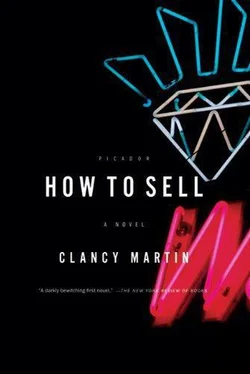That made me think of another time, visiting my father in West Palm, in the summertime, when I was eight or nine. I had finished my eggs and I started to put my dishes in the dishwasher like we did at home. “Nope, not in there, son,” my dad said. He opened the dishwasher so that I could see, but not too widely. Dozens of cockroaches scampered around the plastic walls. “There’s a whole family of them living there,” he said. “I just wash the dishes by hand.”
L arry’s bench was now behind Old John’s: Jim had moved Larry up in the jeweler’s line after he had successfully hand-fabricated a gold breastplate modeled after the breastplate of Aaron for a Jewish cardiologist in Houston. Except for Old John, who was working on a pink gold and chalcedony necklace for a client of mine, one of my Highland Park ladies, everyone had gone home. I sat at Larry’s bench and watched Old John’s deft, pretty torch-work. He had sections of the clouded, grayish blue stone masked off with tiny pieces of balsa wood to protect it from the heat.
Old John had his snake coiled over his shoulders. It knew to keep its head away from the invisible flame of the torch. It was moving, though, looking around with its neck and head, as it liked to do while he worked.
“When are you going to go to college, Bobby?” He said it without turning his head. I was startled. I almost stood up. Then I tried to make it look as though I were only inspecting a tool on Larry’s bench. But Old John hadn’t noticed. He was focused on his work. “When are you going to start making a real life for yourself? ”
“I’m a businessman, Old John,” I said. “This is my life. This is the life I want.”
“Bobby, you are my friend. You are also my boss. But let’s be frank, you aren’t a businessman. You know it and I know it. Maybe everybody doesn’t know it. Not for me to say. But you won’t be able to hide it forever.”
That hurt my feelings. It was something the Polack would say.
“I’m the best salesman in this store, Old John,” I said. “For that matter, people say I’m the best salesman in the whole metroplex. Even Granddad says so.”
“I didn’t say you weren’t a salesman. That’s the chief problem, I’d say. I’ve never seen one better. But a salesman is the opposite of a businessman, Bobby. A businessman cares about the practical details of life. A salesman is an artist. He can’t tie his own shoelaces. He lives on tomorrow. He’s a cloud-and-sky guy, a rainbow man. He can’t hold money. He can’t make a goddamn dollar out of four quarters and a can of glue, if you want to hear the truth of it. That’s you, Bobby.”
I thought there was something I ought to reply. Because I was his employer.
“You can’t snap your fingers and become American, Bobby. It has to come naturally. You didn’t even watch the right commercials growing up.”
I rubbed my hands together and looked down at my legs. Then I plucked up the creases in my pants. I was wearing my dark gray Zegna, my favorite winter suit.
“If you want the truth, you should just grab that girlfriend of yours and go. If I were your father, that’s what I would tell you to do. Pack up everything you love and get on the road.”
It was getting late, so these phrases imprinted on me. My father had told me a similar thing once, and Granddad and Kizakov had both dropped hints.
He couldn’t mean the same girlfriend I meant. But that didn’t matter.
The snake turned and looked deeply at me then. It seemed to freeze, and curl its dimpled lips.
T he security gate to Lisa’s apartment complex stayed open for a few minutes after a car went through. That is, it stayed open behind a car coming out. For the cars coming in, the gate was prompt and effective. So I waited to one side until a car left the complex and then swung around it — the driver honked the horn, but we weren’t even close to hitting each other — and made it through the gate. The gate scraped the back corner of the car as I came in. I was irritated at myself because I had just picked up the repaired car from the paint-and-body shop a few days before. If I had to scrape the car I should have scraped the rental.
I knew she was home. I had been watching the apartment from a place where she couldn’t see me. I saw a man drive up, walk up the stairs, and then leave again less than an hour later. He was in a new black Porsche. It still had the dealer tags on it. He was older than me but handsome and in a good suit. A client. I didn’t get a very good look at him. But I could tell by the way he walked that he was a doctor. In my business we can spot doctors immediately.
I was surprised and angry that she worked out of her home. She is even breaking the hooker rules, I thought.
Maybe she had more than one apartment.
After another hour had passed I decided she was probably done for the evening. It was quarter after eleven. That was too early. Maybe it was a lag time.
I knew she was still in there. It wasn’t like she had a back door. But she wasn’t answering the phone.
I went up the stairs and rang her bell. I knocked on the door. I yelled through it. Nothing.
I stayed out there until two or three in the morning. I figured she had to come out eventually. I could stay all night if I had to. At one point a car pulled up and another man got out, a different man than the last one. He started up the stairs, with his keys in his hand, jingling, and then lifted his eyes when he was almost at the top and saw me sitting there against her door. He stopped. Then he turned around, jogged down the stairs two at a time, got back in his car, and drove off.
D o you know where Lisa is?” I asked her.
“No,” she said.
“You’re lying, Sylvia,” I said.
“You do not call me a liar. No.”
“She wanted me to call her, Sylvia. She told me to call. Her phone isn’t working. She didn’t leave a number.”
“Uh-huh.”
“No, really.”
“Then I guess she’ll call back.”
Sylvia was not someone you could reason with. But I did not have any way to threaten her.
“What if she’s in trouble? What if she needs money?”
“She’s fine. She doesn’t need your money.”
“So you know where she is? You know how to get in touch with her?”
“I have to go, Bobby,” Sylvia said.
“No. No, don’t go,” I said. “When’s the last time you talked to her?”
“When’s the last time you talked to her?” Sylvia asked me.
I didn’t want to say.
“I don’t think she wants to talk to you, Bobby,” she said. “Go home to your wife, Bobby.”
“Please help me, Sylvia,” I said.
“Why don’t you ask your brother,” she said, and hung up.
I told him everything. I had wanted to be strong but then I gave up. Just tell him the truth, Bobby, I allowed myself. It was a great relief. He was my big brother. I needed his help.
But he didn’t talk about Lisa. He only talked about the baby.
“Tell her she can’t have it. It’s your baby, too. Tell her she has to get an abortion. How far along is she? I can talk to Watkins for you. Watkins does them all the time. Only for friends, of course. It can be totally private, like a regular doctor’s appointment at his office. He would probably even do it on trade. His girlfriend wants a Cartier tank.”
“I can’t very well tell her it’s my baby, too, and use that premise to argue her into having an abortion. Plus she won’t return my calls.”
“Don’t argue with her. Sell her. You are a salesman, for crying out loud.”
“She won’t talk to me, Jim. I don’t even know where she is. You don’t know, do you? Do you know where she is, Jim?”
Читать дальше











